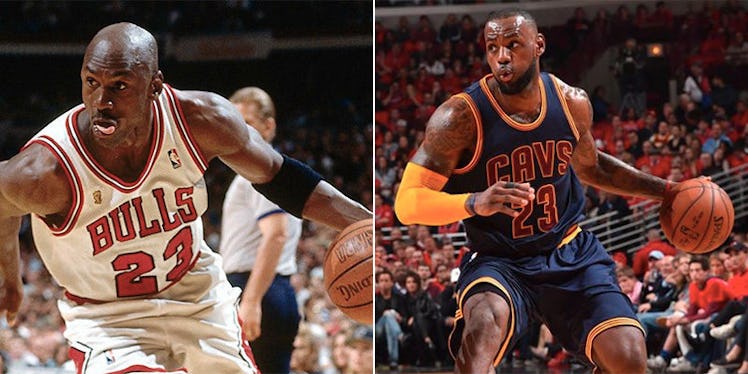
The Real Reason LeBron Could Be As Good As Jordan If He Wins This Year
If you think about it, the way in which we debate greatest players in basketball is pretty lazy.
For a while, we entertained the idea of Kobe Bryant being better than Michael Jordan, for example.
Then Kobe broke down with injuries before he could match Jordan's six championships and, welp, now we're done with that discussion.
This time around, LeBron James has made it to his fifth consecutive NBA Finals, and we've just started to seriously consider whether or not he could be better than Jordan.
But if the Kobe conversation is any indication, we'll still conclude LeBron will have a long way to go if he wins this series, by the mere virtue of him being three rings behind Jordan.
That's pretty silly. Deep down, we must know that's pretty silly.
The idea that the amount of championships one attains, an accomplishment that has so many variables at play, could weigh so heavily in a conversation that deserves consideration of so much more context is, in a vacuum, absurd.
In reality, though, so much of that context (the level of competition each player faced, the impact of their coaches, the different sets of rules each played under) is so hard to quantify.
And so, we usually get tired of trying and just revert to the ol', trusty counting of championship rings.
Comparing eras, after all, is hard work. But Five Thirty Eight just made it a bit easier.
Last week, the ESPN-owned site published an article that ranked the best supporting casts (players outside of the team's best) to make it to the NBA Finals between 1985 and 2015, using each contenders statistical Plus/Minus numbers.
For the purpose of this article, we added red stripes to highlight the rankings of Jordan's supporting casts.
What we see here is pretty clear.
Based on this chart, Jordan had three of the top-six best supporting casts and the overall best supporting cast of the past 30 years, the 1996 Chicago Bulls, with 72 wins.
LeBron, in contrast, led two of the three worst supporting casts and three of the bottom eight.
And, since these rankings were produced before Kyrie Irving was ruled out for the rest of the current Finals series, you could make a serious argument that the team he led to a Game 2 win on Sunday night was literally the worst supporting cast of the past three decades.
This brings to light one of the simple truths about the LeBron James vs. Michael Jordan debate: Jordan's teams were way better than we give them credit for and LeBron has had to deal with way less help than we give him credit for.
There are a few guys in mainstream media who have pointed this out, too. Colin Cowherd, for instance, will frequently point out how Jordan's departure from the '93 Bulls only resulted in a two-game dip (from 57 wins to 55) for the '94 Chicago squad, which was led by Scottie Pippen.
That stands in stark contrast to the Cavaliers, who literally went from first to worst after LeBron left Cleveland in the summer of 2010.
Are we really about to forget this the next time we start counting jewelry?
Again, there are so many more important things that we don't include (like the advent of certain offenses, for instance) in our "who's the best?" conversations.
But one of the biggest missing pieces has been handed to us in simple terms and that should dramatically change the way we look at the LeBron-Jordan debate.